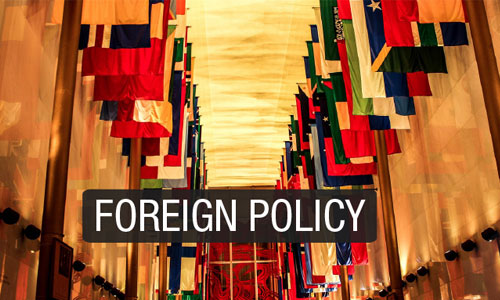Foreign policy is the management of external relations, national interests and activities at international arenas backed by domestic policies. Foreign policy involves goals, strategies, measures, methods guidelines, directives, understandings agreements and so on by which national governments conducts international relations with each other and with international organizations and non-governmental actors. All national governments by the very fact of their separate international existence, are obligated to engage in foreign policy directed at foreign governments and other international actor. Governments want to influence the goals and activities at other actor whom they cannot completely control because they exist and operate by end their sovereignty.
In the other words, no country is self-reliable and self-sufficient; all states are, somehow, interdependent in international system. In recent past, due to the growing interdependencies, there have been debates about global monetary governance. This means, foreign policies need to seek its right goals and measures that are intended to guide government, decisions and actions with regard to external affairs, particularly relations with foreign countries managing foreign relations calls for carefully considered plans of action that are adapted to foreign interests in the complicated world systems. Government officials in leading positions include presidents, chief execution officer, foreign ministers, defense ministers, finance ministers and so along with their closest advisers are usually the key policymakers.
Policy makers involves a means end way at thinking about goals and actions at government. It is an instrumental concept. for example, Afghan government is suffering from international terrorism need to set strategic way of overcoming the fight against international terrorism, since it is an international phenomenon, hence co-operations among states is vital, we need to ask ourselves a fundamental question alike, what is the key problem or goal and what solution or approaches are available to address it?
It is very important to see whether our foreign policy system is able to pursue the right goals and approaches in their true spirit. Unfortunately, because of certain factors like years of instability and economic and political fragility have made the country dependent on others to a large extent and, therefore, the true objectives of the foreign policy never have bee achieved. Moreover, the country could not define and pursue properly its national interests and, resultantly, remained weaker in international arena. To simulate the international context as a football playground, our players are more likely to receive goals instead of making goal due poor policy and weak players.
In a deeper look, there are different factors that influence the foreign policy of a country. In the first place the size of a state’s territory and its population greatly influences its foreign policy. Generally, the leaders and people of a country with small territory and population do not expect their country to carry great weight in international affairs. On the other hand, the leaders and people of large countries are ready to assume special responsibilities. However, sometime even small states which have rich resources also leave a deep impact on world politics.
The geography of a country, including its fertility, climate, location in relation to other land masses and water-ways etc. also influence the country’s foreign policy. It is a major factor in determining self-sufficiency of a country. Generally, land-locked countries, nations in the tropics and those bordering a superpower are less self-sufficient in comparison to the countries which have access to warm-water ports or are located in the temperate zones and far removed from superpowers.
The national unity, cultural and historical traditions of a country also deeply influence the foreign policy. Generally, people possessing a unified common culture and historical experience can pursue an effective foreign policy because of the support of all sections of society who share the same values and memories. On the other hand, a country which is culturally and historically fragmented cannot pursue an equally effective foreign policy. Apart from these internal factors there are certain external factors as well that influence the foreign policy of a country. The contemporary international organizations greatly influence the foreign policy of a country. While formulating its foreign policy the country has to take note of the international law, treaties and contracts. No country can ignore these factors without jeopardizing its own interests. Apart from the structure at the global level, the structures at the regional and sub-regional levels also greatly influence the foreign policy of a country.
In case of Afghanistan, the international influence has been on a large scale. As the country has been dependent on international organizations and other powerful and some neighboring countries, its foreign policy has always been under pressure. As far as the internal factors are concerned, Afghanistan’s geography, due to its heartland location, mineral resources and more importantly the weak players, has been the battle ground for great games. This has influenced the country to a great extent. On the other hand, the country’s cultural heterogeneity has always hindered creation of a homogenous national sentiments. Unfortunately, our leaders have frequently failed to fill the social and political gaps on the basis of social justice and pluralistic approaches.
Given the landblink features of this country, it has a great potential to become the center of regional cooperation and opportunities; it can ensure the interests all regional nations if we could follow an active diplomacy via qualified diplomats. Today, no is self-reliable and self-sufficient country in the world; in fact, all need resources which are spread over the globe. This resources cannot be exchanged without transitional road. So, this is the job of foreign policy to highlight and coordinate this role through a reliable and peaceful policy.
Home » Opinion » What is Foreign Policy?
What is Foreign Policy?
| Mohammad Zahir Akbari

